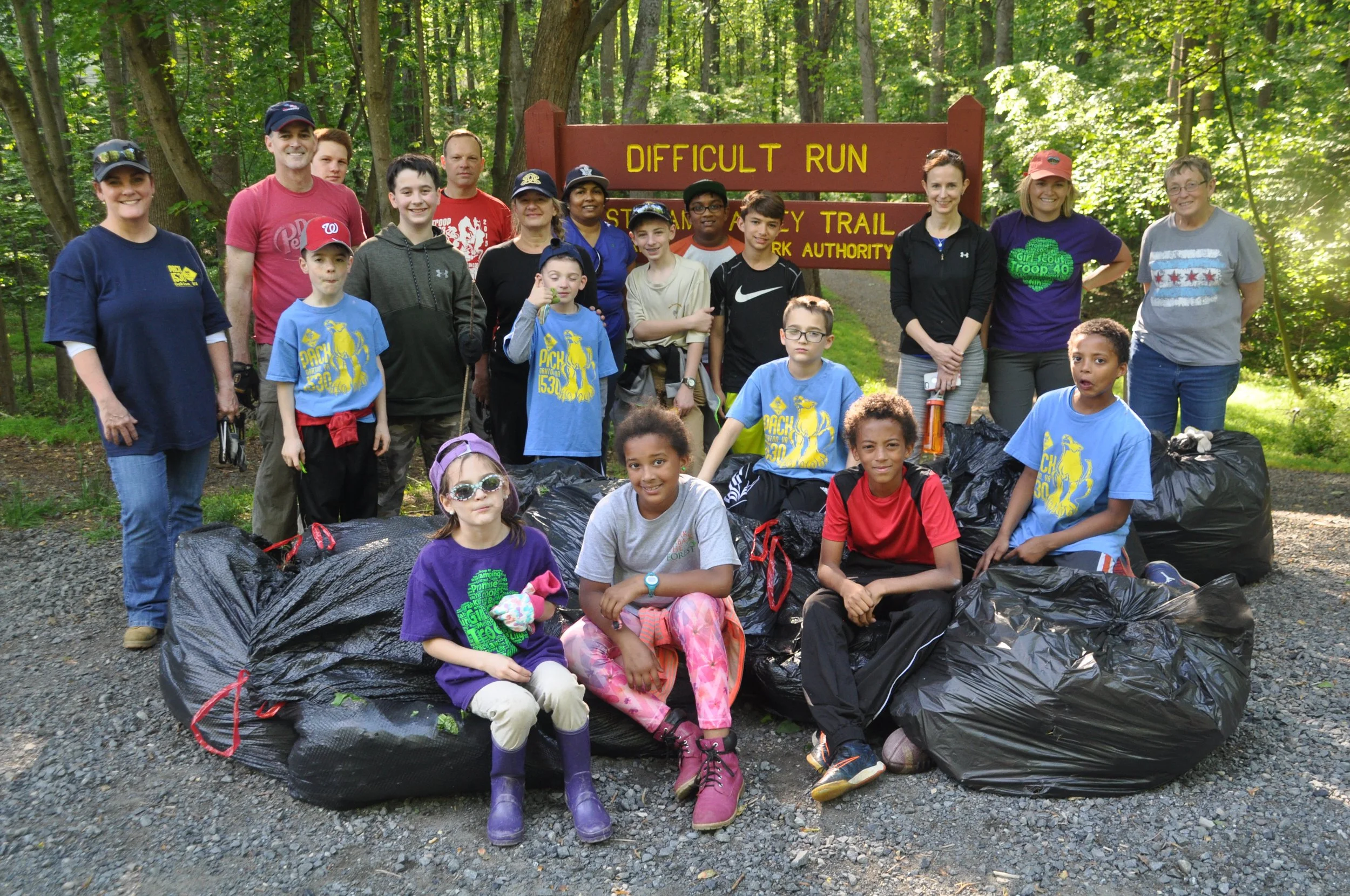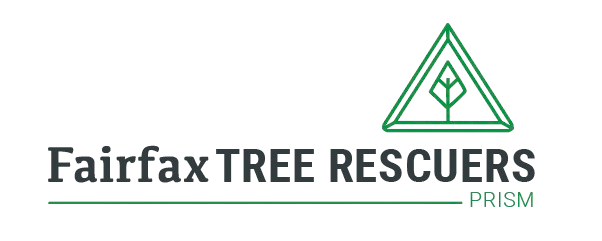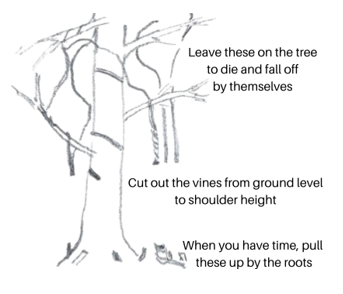
How to Lead a Tree Rescue
Lead your own event to save trees from invasive vines—safely, legally, and effectively.
Introduction
If your event is open to the public, please add it to the Fairfax Tree Rescuers PRISM calendar by filling out the event submission form.
On this page find the following quick links to planning your event
Choosing a Location
Parks
Require training and permission from Fairfax County Park Authority or National Park Service.
If not certified, PRISM can pair you with a trained leader.
Note independent jurisdictions (Falls Church, Vienna, etc.) may differ.
HOAs
Excellent for multi-acre properties owned by community associations, pools, or religious centers.
VDOT Rights of Way
Great option—but requires a permit unless you have authorization from adjacent landowners.
Private Residential or Commercial
Perfect for neighborhood-based or small community rescues. Bringing people together to help the neighbors is great for community spirit (and may be the only way that some trees ever get saved.)
Considerations for any location
Resource Protection Areas – check the Fairfax Jade Map to see if the area in question is within an RPA (which basically means within 100 feet of a stream or wetland). If so, you will need a permit to do any vegetation disturbance. Allow 1-2 months.
Safety – You should walk the location first and look for poison ivy, steep slopes, proximity to car or bike traffic, or other hazards.
Access – Is there enough parking? A long walk?
Target species – Is there enough work to keep a crew busy? It is most fun and gratifying to work in locations where volunteers can see that they have actually freed up specific trees.
Scheduling, Advertising, & Outreach
Scheduling
Duration: 2 hours is ideal for most volunteers.
Timing: Afternoons (cool weather); mornings (hot weather).
Days: Weekends = best turnout.
Advertising & Outreach
Use bullet lists or icons for channels:
Email friends & neighbors
Nextdoor & Facebook groups
HOA or faith newsletters
Flyers at libraries & community centers
Local papers (Patch, Connection News)
Scout troops, schools, clubs, sports teams
We’ll publish every event we hear about, but your own outreach makes the difference.
Registration & Sign In
Registration
Pre-registration is helpful if you want to avoid surprises. It allows you to plan for the numbers and to reach people to cancel if necessary, and it gives you the opportunity to set expectations, explain the rules, and gather consents. It also gives you a way to invite them to future events. If you don’t have your own registration method, we can provide you an online form tailored to your event. Here is an example.
It is fine for you to gather registrations in multiple ways, for instance by posting on the IMA calendar (if it is an IMA site) and using our registration form when advertising it other ways.
Consider whether you want to include children, and how old they need to be to come without their parents. Are you prepared to be the responsible adult? Will there be another adult with you? Don’t be alone with a child who is not your own.
Sign In
Have people sign in as they arrive. You will need their name, email address, emergency contact phone number, photo release, and acknowledgement of risks. It would be extremely helpful if you also ask whether they want to receive updates from Fairfax Tree Rescuers PRISM (then send us those email addresses.)
Tools & Supplies
Manual Tools (Preferred)
Long-handled loppers (lightweight)
Hand clippers & saws
Pry bars / large screwdrivers for ivy removal
Shovels or pickaxes for roots (use with spacing caution)
Power Tools —
🚫 Prohibited
No power tools at PRISM events due to safety concerns.
Herbicides
Government land: only for trained volunteers under jurisdiction supervision.
Private land: cut-stump treatment can be highly effective (reduces erosion).
First aid kit – bring one.
Other Essentials
First aid kit
Trash bags (for seeds if needed)
Colored tape for marking vines
Water, gloves, sunscreen, insect repellent
Event Kick-off
Introductions
Welcome volunteers, explain why trees need rescuing.
Clarify native vs. non-native vs. invasive species.
Make it fun! Many volunteers have never done anything like this before. Use humor and little challenges, and don’t expect everyone to be comfortable wading into the undergrowth.
Safety Briefing
Hazards: poison ivy, thorns, uneven ground, heat, cold, tools.
Rule: Never pull vines down from trees (risk of injury to people and the tree).
Teaching Plant Identification
Quick teaching strategies:
Show live samples of target species.
Focus on one or two invasives per event.
Mark species with colored tape (target or “do not cut”).
Emphasize “We’re here to save trees, not harm them.”
Tree Rescue Techniques
Draping vines:
Cut at ground level and shoulder height to create a visible gap.
Leave vines above to dry out naturally.
Clinging vines (English Ivy, Wintercreeper):
Cut 6-12 inch gap; avoid bark injury.
If thickly covered, lightly scrape leaves to expose bark before cutting.
Be sure you know how to tell these from Poison Ivy.!
Pro Tips:
Keep volunteers together; supervise more than you clip.
If you will be doing cut-stump treatment after the volunteers do the cutting, have them cut higher first, so you (or they) can re-cut before applying.
Debris Management
Where practical, leave cut material under trees to decompose.
Flatten by stepping on it to prevent re-rooting.
If removal is required → bag and dispose in trash, not yard waste.
Bag seeds if feasible, balancing that with the time you could be spending rescuing more trees.
Recruiting & Inspiring Volunteers
Explain PRISM’s mission to attendees.
Share ways to stay involved:
Become a Community Representative
Take Park Authority Tree Rescuer training
Get your community or business to adopt a park
Encourage photos & posts (with permissions).
Collect sign-ups for PRISM updates.
Publicity materials for events
Use the link on the Plant NOVA Trees website to order free handouts and signs. Allow at least a couple weeks.
One of our volunteers will mail these from their home. Order plenty! The postage costs as much as the materials.
Rescue Trees brochures
Rescue Trees stickers
These you will pick up at the nearest Staples or Office Depot
Small posters about tree rescues
This will come in the mail
A yard sign to put up during events that says “Invasive plant removal in progress. Please don’t plant invasive species that injure our ecosystem.”
For Tree Rescuer door hangers, use the link on this page to sign up. We’ll ask you to report how many you distribute and how many at-risk trees you spot.
We pay for all of this out of donations. We don’t charge for them, but please consider donating if it won’t stretch your finances.
If you would like to wear identifying clothes, you can order Rescue Trees hats and shirts on CafePress




